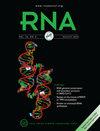DDX39B 的低效招募阻碍了 FOXP3 内含子上的前剪接体组装
IF 4.2
3区 生物学
Q2 BIOCHEMISTRY & MOLECULAR BIOLOGY
引用次数: 0
摘要
叉头盒 P3(FOXP3)是决定调节性 T(Treg)细胞命运的转录因子,对其发育、功能和稳态至关重要。FOXP3 基因突变会导致免疫调节多内分泌肠病 X 连锁(IPEX)综合征,FOXP3 的异常表达也与多发性硬化症和癌症等其他疾病有关。我们以前曾证实,FOXP3 RNA 的前 mRNA 剪接对 DExD-box 多肽 39B(DDX39B)的水平高度敏感。FOXP3 内含子具有富含胞苷(C)/贫含尿苷(U)的多嘧啶(py)束,这是导致其剪接效率低下并使其对 DDX39B 敏感的原因。我们的研究表明,FOXP3 内含子上的承诺复合物(CC)的组装存在缺陷,这与 U2AF2 对富含 C/U-poor py 道的较低亲和力是一致的。我们的数据表明,U2AF2 对 CC 向前缀体的转化有更强的影响。我们认为,这是由于 U2AF2 与富含 C/贫含 U 的 py 道结合时改变了构象,而这种构象对 DDX39B 的亲和力较低。因此,组装在 FOXP3 内含子上的 CC 在招募 DDX39B 方面存在缺陷,从而导致前剪接体复合物的组装效率低下。本文章由计算机程序翻译,如有差异,请以英文原文为准。
Inefficient recruitment of DDX39B impedes pre-spliceosome assembly on FOXP3 introns
Forkhead box P3 (FOXP3) is the master fate-determining transcription factor in regulatory T (Treg) cells and is essential for their development, function and homeostasis. Mutations in FOXP3 cause immunodysregulation polyendocrinopathy enteropathy X-linked (IPEX) syndrome, and aberrant expression of FOXP3 has been implicated in other diseases such as multiple sclerosis and cancer. We previously demonstrated that pre-mRNA splicing of FOXP3 RNAs is highly sen-sitive to levels of DExD-box polypeptide 39B (DDX39B) and here we investigate the mechanism of this sensitivity. FOXP3 introns have cytidine (C)-rich/uridine (U)-poor polypyrimidine (py) tracts that are responsible for their inefficient splicing and confer sensitivity to DDX39B. We show that there is a deficiency in the assembly of commitment complexes (CCs) on FOXP3 introns, which is consistent with the lower affinity of U2AF2 for C-rich/U-poor py tracts. Our data indicate an even stronger effect on the conversion of CCs to pre-spliceosomes. We propose that this is due to an altered conformation that U2AF2 adopts when it binds to C-rich/U-poor py tracts and that this conformation has a lower affinity for DDX39B. As a consequence, CCs assembled on FOXP3 introns are defective in recruiting DDX39B and this leads to inefficient assembly of pre-spliceosome complexes.
求助全文
通过发布文献求助,成功后即可免费获取论文全文。
去求助
来源期刊

RNA
生物-生化与分子生物学
CiteScore
8.30
自引率
2.20%
发文量
101
审稿时长
2.6 months
期刊介绍:
RNA is a monthly journal which provides rapid publication of significant original research in all areas of RNA structure and function in eukaryotic, prokaryotic, and viral systems. It covers a broad range of subjects in RNA research, including: structural analysis by biochemical or biophysical means; mRNA structure, function and biogenesis; alternative processing: cis-acting elements and trans-acting factors; ribosome structure and function; translational control; RNA catalysis; tRNA structure, function, biogenesis and identity; RNA editing; rRNA structure, function and biogenesis; RNA transport and localization; regulatory RNAs; large and small RNP structure, function and biogenesis; viral RNA metabolism; RNA stability and turnover; in vitro evolution; and RNA chemistry.
 求助内容:
求助内容: 应助结果提醒方式:
应助结果提醒方式:


